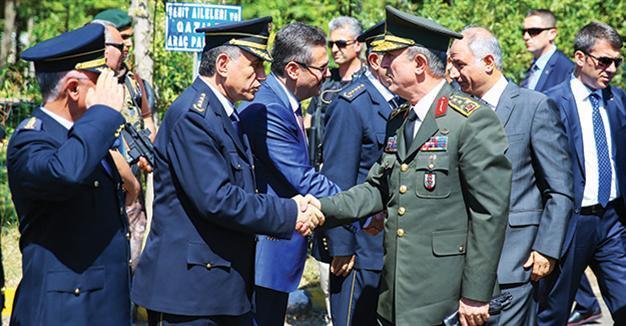Turkey’s military council to convene after failed coup bid
ANKARA

AA photo
Turkey’s Supreme Military Council (YAŞ) is expected to convene on July 28 to discuss restructuring the country’s military following a failed coup attempt, while the meeting has been overshadowed by questions surrounding promotion decisions taken at meetings over the past three years.This year’s YAŞ meeting will witness a number of firsts, including its location, duration and points of debate, as the ruling Justice and Development Party (AKP) government reorganized the session following a failed coup attempt on July 15, allegedly carried out by followers of U.S.-based Islamic scholar Fethullah Gülen that infiltrated into Turkey’s military.
Although the meeting is traditionally held at the “Çakmak Hall” at the Presidency of the General Staff, this year’s location was designated as the Çankaya Palace of the Prime Ministry in Ankara.
Former Air Force Chief Gen. Akın Öztürk, one of the key suspects of the coup attempt and also a YAŞ member, will not join the meeting as he is currently under arrest. Similarly, Lt. Gen. İsmail Metin Temel will attend instead of Commander of the 2nd Army Gen. Adem Huduti, who is also under arrest.
While YAŞ meetings are regularly held over a period of three days, this year’s meeting will be completed within a day, Turkish Prime Minister Binali Yıldırım announced, adding the decisions will be shared with the public following the approval of President Recep Tayyip Erdoğan.
Government members and soldiers who are set to attend the meeting are expected to decide on promotions and appointments, in addition to measures related to the failed coup attempt. The meeting, however, has been clouded over doubts surrounding the merit of decisions made in recent YAŞ sessions.
Reports suggested that a significant number of the generals who were promoted during the meetings since 2013 were detained as part of the nationwide investigation into the Fethullahist Terror Organization (FETÖ), and their advancements were partly enabled by a number of cases that later turned out to be based on forged evidence.
During the 2013 YAŞ meeting under former Chief of General Staff Gen. Necdet Özel, five major generals were promoted to lieutenant general, and only Lt. Gen. İlhan Talu was arrested as part of the coup attempt. Likewise, two of the 11 soldiers who were promoted to major general were arrested.
However, a total 18 out of the 25 staff colonels who were promoted to brigadier general were arrested in the aftermath of July 15. Strikingly, all of the nine colonels on top of the promotion list were believed to be part of the coup plot.
Similarly, the only lieutenant general who became a four-star general during the 2014 YAŞ meeting, Gen. Huduti, was arrested after the coup attempt. Two of the five newly-appointed lieutenant generals and five of the 11 soldiers who became major generals in 2014 were also arrested. Moreover, a total of 12 of the 21 staff colonels who became brigadier generals were also arrested.
Finally, two of the six major generals who were promoted to lieutenant general during the latest YAŞ meeting in 2015, and two of the nine who became major generals, were arrested. 18 of the 26 newly-appointed brigadier generals were also put under arrest.
These figures display a dramatic rise compared to figures from 2011 and 2012, where a total six and 10 promoted soldiers were arrested, respectively.
Reports suggested the situation held not only for the land and air forces but also for the naval forces, as the promotion of scores of qualified and experienced naval officers were blocked through cases such as Balyoz (Sledgehammer) and other military spying cases that later turned out to be fictitious.
Balyoz was an alleged military coup plot drafted in 2003 in order to overthrow the AKP. The military was accused of planning drastic measures to foment unrest in the country In order to remove the AKP from power, including bombing two major mosques in Istanbul and an assault on a military museum by people disguised as religious extremists.
Balyoz was allegedly decided on during a planning seminar held at the 1st Army Command and hence an activity by members of the Land Forces, while 22 admirals and a number of staff colonels from the Naval Forces were among the 194 suspects in the case.
The case was later expanded to include nearly 90 naval staff colonels, who were also prevented from promotion by initially being made defendants and later by being convicted – leading to their discharge from the Turkish Armed Forces (TSK), if not their resignation, raising eyebrows as a number of staff colonels were promoted to admiral positions over the same period.
Almost all judges and prosecutors who took part in the Ergenekon and Balyoz cases and a number of police officers involved in the process have faced accusations that they were acting under commands from Gülen
















